You might not think it, but Sanskrit has versions of the knock-knock joke. In Mahāsubhāṣitasaṃgraha, a compilation of Sanskrit proverbs and parables, is an interesting verse describing a whimsical conversation between the Hindu god Shiva and his consort, goddess Parvati. It has wordplay, a dash of irreverence, and a neat conclusion.
Parvati: Who’s there?
Shiva: Shūlī (ie, Shiva or a colic patient)
Parvati: Go find a doctor.
Shiva: Oh dear! I am Nīlakaṇṭha (ie, Shiva or a peacock)
Parvati: Then squawk like a peacock.
Shiva: I am Pashupati. (ie, Shiva or a bull)
Parvati: But I do not see any horns.
Shiva: Innocent one, I am Sthānu (ie, Shiva or a tree trunk)
Parvati: How then are you moving about?
Shiva: I am the very life of Shivā (a term used to describe Parvati, or a fox)
Parvati: Then go to the forest.
Poet: May the Lord Shiva who was defeated in repartee protect us all.
Hāsya Rasa, the sentiment of laughter, has been part of Indian aesthetic theory since ancient times. As far back as 2,000 years ago, it was listed as one of the eight rasas or sentiments, in the Nāṭyaśāstra (Science of Drama), attributed to the sage Bharata Muni.
If emojis had existed in ancient India, doubtless they would have found willing users among the Sanskrit poets. The 10th century text on dramatology Daśarūpaka of Dhanañjaya, for instance, describes different kinds of laughter from people belonging to different strata of society. Members of the upper class show mirth with smita (a gentle smile) and hasita (a chuckle). Those from the middle classes, it states, respond with vihasita (a laugh with a soft sound) and upahasita (a laugh accompanied by a shaking of the head). Members of the lower classes enjoy apahasita (uproarious laughter accompanied by tears) and atihasita (convulsive laughter). While such analysis feels problematic and flawed today, it is yet more evidence of the importance accorded to humour since ancient times.
Glimpses of humour can be seen even in the Ṛgveda, the oldest of Hinduism’s sacred books. The Frog Hymn in the seventh mandala of the Ṛgveda describes the advent of the monsoon in India. This hymn comically compares the actions and croaking of frogs to the ritual acts and recitations of priests. It also caricatures the teaching pedagogy of the time, by comparing the chorus of frog with that of pupils repeating after their teacher.
Ancient Sanskrit verses ran the range from funny to satirical, critiquing and mocking figures of power, religion and sanctity, while giving voice to popular sentiment about them.
Take the example of Mattavilāsa Prahasana (The Farce of Drunken Sport), a comedic drama composed in Sanskrit in the early 7th century by Mahendravarman, a ruler of the Pallava dynasty in southern India. This satirical play critiques the religious figures and practices of contemporary society, particularly of certain sects of Hinduism and Buddhism.
One of the characters in the play, a Buddhist monk named Nagasena, for instance, thanks the Buddha for bestowing favours on his community of monks as they live in palatial residences, sleep on well-made mattresses, eat heartily in the morning followed by tasty drinks in the afternoon, chew betel leaves with five condiments, and wear fine robes. He then wonders why alcohol and consorting with women are forbidden, and entertains the idea that perhaps these were not so originally. He concludes that such rules were likely added to the books by mean-minded elders.
Laṭakamelaka (Conference of Scoundrels), a 12th century Sanskrit farce written by Śaṅkhadhara, is particularly interesting for its nomenclature of characters. A family freeloader is named Kulavyādhi (Disease of his Family); a shrewish wife is Kalahapriya (Fond of Discord); a Digambara Jain monk is Jaṭāsura (Demon with Matted Hair); a Shaivite mendicant is Ajñānaśri (Rich in Ignorance); a hypocritical Brahmin is Mithyāśukla (Falsely Pure); and a deviant Buddhist monk is named Vyasanākara (Ocean of Vice).
A common butt of jokes in Sanskrit literature were doctors and quacks. A doctor in the 14th-century farce Hāsyārṇava Prahasanam (The Ocean of Mirth), written by Jagadīśvara Bhaṭṭāchārya, is named Vyādhisindhu (Illness Ocean), and is the son of Āturāntaka (Killer of the Sick), while a doctor in the 16th-century satire Kautukaratnākara (Trove of Comedies), written by the poet Kavitārkika in Noakhali in present-day Bangladesh, is named Vyadhivardhaka (Increaser of Diseases).
Even specific scams run by quacks (seemingly through the ages), such as the eternal quest for the reversal of balding, and hair-restoration fraud, find resonance. As the 11th-century Kashmiri satirist and polymath Kshemendra wrote in his Kalāvilasā (The Grace of Guile):
The quack rejuvenator,
with a head bald like a copper pot,
withered with old age,
pilfers bald men with tales of sprouting hair.
Kshemendra was a prolific medieval satirist. He also wrote Samayamātrikā (Prostitute’s Breviary), Narmamālā (A Garland of Seductions) and Deśopadeśa (Advice from the Countryside), in which he ridiculed alchemists, astrologers, fake gurus, cheating gamblers, corrupt judges, political leaders, sycophants, and those of blind faith.
Sanskrit satirists wrote sexual humour, made light of heroism and romance, caricatured fools, jesters, merchants and prostitutes. But humour in Sanskrit also carried the voices of protest and did not fail to satirise kings and even gods. It’s unfortunate to think that some of these ancient verses now seem ahead of our time, in the current age of growing intolerance.
(Abhishek Avtans teaches Indic languages and linguistics at Leiden University in the Netherlands)
.
See 10 more verses, from the new book Anthology of Humorous Sanskrit Verses by A.N.D. Haksar
Once he began looking, says diplomat-turned-translator A.N.D. Haksar, he began to find wry humour everywhere, in ancient collections featuring poems from Kashmir to southern India, even in the millennia-old Bhagavad Gita and Mahabharata. Many of the themes were universal: annoyance at nepotistic politicians, anger at cheating traders, frustration over the lies of fake godmen; wry takes on the impossibility of marriage. The names of most of the poets are lost to history, but thankfully their lines survive. Here, then, are 10 humorous verses from Haksar’s new anthology. (Titles and interpretations by Anesha George)
Holy repose
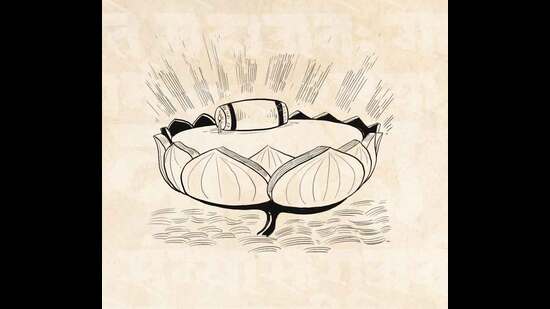
Lakshmi sleeps on a lotus blossom,
Shiva on a hill of snow,
and Vishnu sleeps on a sea of milk.
I think this is because they are all worried
about the bed bugs where they lie.
Taken from Subhashita Ratna Bhandagara (A Treasury of Verse Gems), a collection of Sanskrit adages compiled from across different ages in ancient India. The verse reflects how even the gods weren’t spared when it came to humorous writing. The anthropomorphism is also interesting in how it attempts to make these powerful deities seem relatable. “It is very different today, when people get readily offended by religious jokes,” says Haksar. “Some of the verses in my book are from the Bhagavad Gita and parts of the Mahabharata and even these texts have their own sense of witty humour.”
.
Marital miss
Like the moon he is in looks,
as a cuckoo in his voice,
like a pigeon he kisses, like a swan he moves,
and crushes a girl in his embrace,
as could do an elephant:
such is my husband, with all merits
that young women admire.
There is no defect, but if there are
difficulties, then they must be
that he is married to me.
This verse can be traced back to Subhashitavali (Garland of Well-Said Verses), a 16th-century compilation of poetry by poets ranging from Vyasa and Valmiki (4th and 5th centuries BCE) to Kalidasa and Banabhatta (4th and 7th centuries BCE). While on the face of it a tongue-in-cheek ribbing of a man by his wife, Haksar believes the verse is also a subtle acknowledgement of the need for mutual freedom in every relationship. “It’s intriguing to note how poets in ancient India often added hints of progressive thought, as of marriage being a social constraint, into their work,” he says.
.
Faith and folly
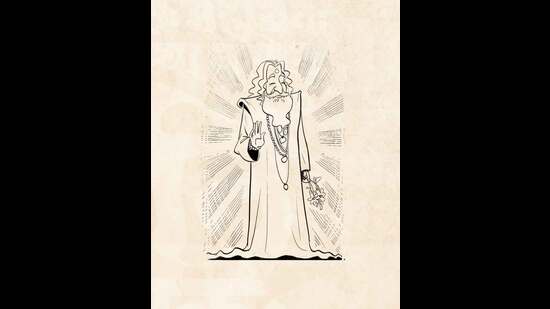
Having bathed in the sea, he sits on the shore before the people—
that ascetic, his body draped
in a saffron-coloured robe,
thinking where to get as alms
some broth mixed with honey and butter,
in the houses of young women
whose husbands have gone away.
This verse from the 13th-century text Sukti Muktavali (A Pearl String of Verses) composed in southern India takes on fake godmen. “While the working classes have always been skeptical of classical tropes of renunciation or becoming a monk, it is interesting to note how these folk interpretations have crept into the highbrow literature of Sanskrit,” says linguistics professor Abhishek Avtans.
.
Minister of nought
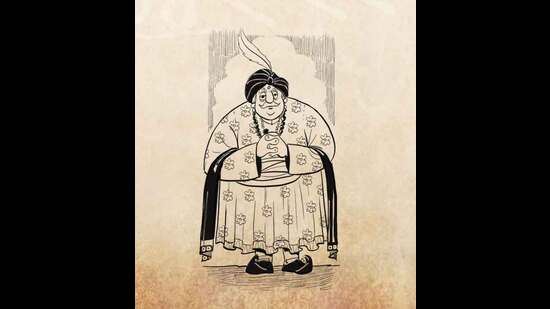
No learning or eloquence,
not even any craftiness;
how can you then have, minister
the feeling of not being rewarded?
This verse, also from Sukti Muktavali, takes a dig at politicians and the concept of nepotism, where influential, undeserving people without necessary skills get top jobs, an idea that remains universally resonant today. Such verses plainly and deftly exposed injustices and inequalities in society, without the fear of reprisal. A potshot at the undeserving minister has been a recurrent theme in humour, even to this day, says Avtans.
.
Doctor who?
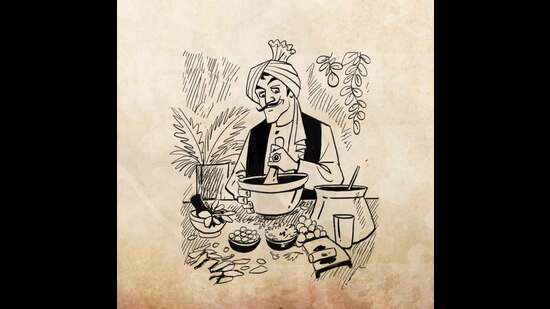
They farm their land in timely rains,
but rain untimely pleases physicians—
the first increases crops of grain,
but the second spreads disease.
A satire on the medical industry hits out at mercenary doctors and highlights the agonies of the poor, in this verse from Sukti Muktavali. While doctors have traditionally enjoyed god-like status in India, going back to ancient times, the commercialisation of the health sector seems to have been a concern even in the 13th century.
.
Sales tricks
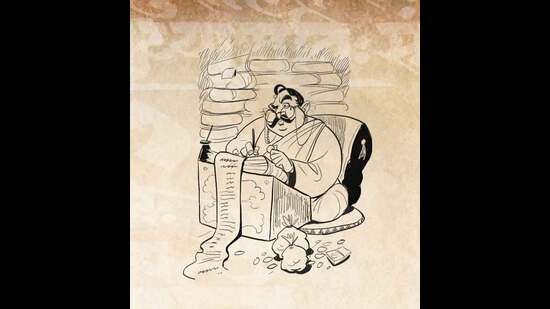
Cleverness in weighing goods in purchase or sale
and tricks for confiscating deposits:
thus do they, these day-time robbers,
the traders steal from people
This verse from Sarngadhara Paddhati (Guide of Sarngadhara), compiled by the poet Sarngadhara in 14th-century Rajasthan, is a witty take on crony capitalism. While traders, money lenders and merchants were often patronised by the upper classes, linguistic experts find it amusing that even they, despite their power and money, weren’t safe from the discerning eyes of poets who immortalised their unscrupulous ways.
.
Purple prose
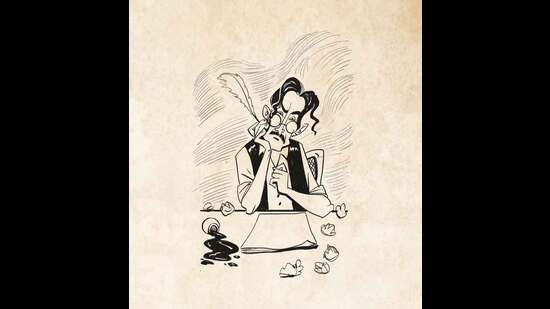
He cannot read what others write,
his own script no one can read:
the curious thing about him is
that he himself cannot decipher
that of which he is the writer.
It is this verse from Subhashitavali that prompted Haksar to begin his translation effort. In just 31 words, it cuts down the self-important writer / poseur so effectively but indulgently that Haksar believed the world needed a compilation of humorous Sanskrit verse. “It took me days to get the translation for this just right,” Haksar says.
.
Senior moments
I am now old, the hair gone white,
my teeth have all decayed;
but this is not what makes me sad.
It is when young women, seeing me
then cry out, ‘O Father! Father!’
That’s like a strike by a thunderbolt
A candid take on aging, this verse from Sukti Muktavali is something most people of a certain vintage can identify with. Independent verses like these are timeless, says Haksar, and to think they found their way into elite Sanskrit texts makes it even more entertaining.
.
News to misuse
Logic, brother, what’s your meaning?
Analysis, friend, you can also cheat.
Vedas, dear, where are your blessings?
And in a bad way are you, O Poetry!
All of you are used by rogues
for spreading dominion of their rulers.
Taken from Sukti Muktavali, this verse is a wry comment on those who claim to be learned but only serve the agendas of those in power. It suggests that, for centuries, facts have been twisted, opinions revised, and religion misused, by the learned and the powerful, in cahoots over vested interests.
.
Sting operation
From another mouth, it is a curse,
but just a joke from one much loved;
it is like burning fuel or incense—
one leads to smoke, the other to fragrance.
This Sukti Muktavali verse is an interesting take on human psychology. It speaks of how it is not what is said, but by whom, that determines the impacts of words. Whom do we take offence at? How does this affect the freedom of speech of those seen as the “other”? The verse posits interesting questions in a world where so many are so quick to take offence, sometimes with lethal consequences.
Enjoy unlimited digital access with HT Premium
Subscribe Now to continue reading

Stay connected with us on social media platform for instant update click here to join our Twitter, & Facebook
We are now on Telegram. Click here to join our channel (@TechiUpdate) and stay updated with the latest Technology headlines.
For all the latest Art-Culture News Click Here
